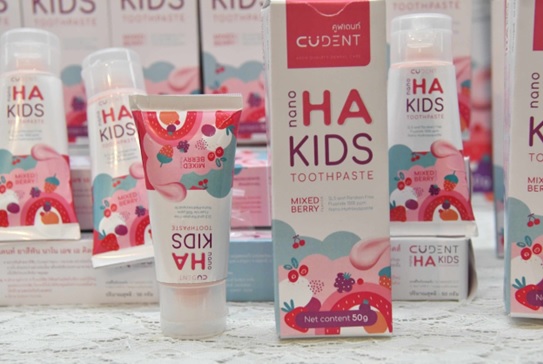
NSTDA and Chulalongkorn University unveiled a nano-hydroxyapatite toothpaste for kids. Developed by Assistive Technology and Medical Devices Research Center (A-MED) of NSTDA and Chulalongkorn University Faculty of Dentistry, the new toothpaste helps remineralize and restore tooth enamel and is part of a project to create innovations to promote oral health of Thai people and to strengthen Thai healthcare industry.

A-MED Director Dr. Kitti Wongthavarawat stated that tooth decay is a major oral health problem. More than 50% of Thai kids have cavities due to poor dental hygiene. To overcome this problem, A-MED and Chulalongkorn University Faculty of Dentistry teamed up to develop a nano-hydroxyapatite toothpaste to heal early stage of dental caries and prevent other oral health problems resulting from poor dental hygiene that can negatively affect the quality of life. The partnership combined A-MED’s vast expertise in nano-hydroxyapatite synthesis and medical implants with knowledge and experience in dental medicine provided by Chulalongkorn University Faculty of Dentistry.
Nano-hydroxyapatite is a calcium phosphate compound. It is a synthetic version of hydroxyapatite that is naturally found in human teeth and bones. Nano-hydroxyapatite is biocompatible and can help remineralize and repair tooth enamel, making it an ideal ingredient to add to a toothpaste to combat tooth decay.
The developed nano-hydroxyapatite synthetic process enables the domestic production of this essential compound for medical implants and reduces the imports, making medical devices more accessible which is in line with the goal of BCG Medical Device policy.

Prof. Pornchai Jansisyanont, Dean of Chulalongkorn University Faculty of Dentistry, explained how nano-hydroxyapatite works. Nano-hydroxyapatite breaks down into calcium and phosphate ions which are then adsorbed on enamel surface, resulting in the remineralization of tooth enamel. Based on this fundamental concept, a toothpaste preventing dental caries is developed, turning research work into a commercial product.
Dr. Dusit Nantanapiboon, Director of Chulalongkorn University Dental Material Research and Development Center, said that the research team studied the caries prevention performance and cytotoxicity of the developed nano-hydroxyapatite toothpaste. The developed nano-hydroxyapatite toothpaste was found to be less toxic to cells than general toothpastes on the market. Performance test showed that enamel surface becomes stronger and smoother after using nano-hydroxyapatite toothpaste for 15 consecutive days. This toothpaste is suitable for kids starting teething and older. It is in the process of FDA registration and its commercial production is expected to start later this year.
